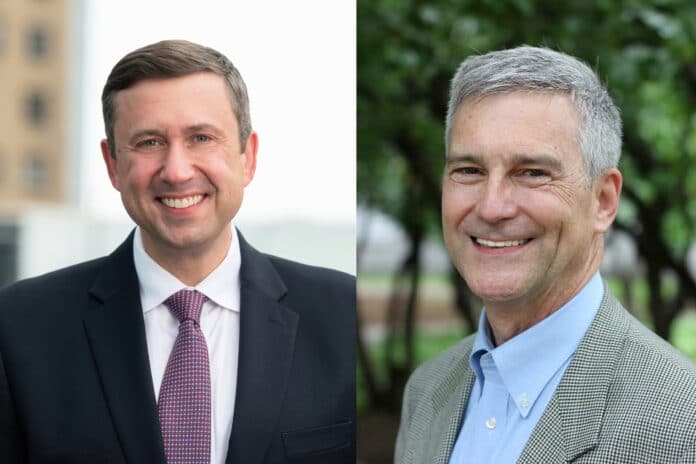When Ken Martin and David Hann sat down for a sparring session last week on a new-ish podcast jointly hosted by two Republican politicos, it wasn’t the first time the respective chairs for the DFL and Republican Party of Minnesota debated over a topic du jour.
The veteran political leaders have appeared together a number of times before high school students, at colleges and in front of various business and community organization events.
But Martin and Hann’s conversation on the Sept. 12 episode of “The Break Down with Brodkorb and Becky” got a little more heated than some of their other recent public discussions.
What began as a post-mortem debate over the 2023 “DFL trifecta”-influenced legislative session and the upcoming 2024 election cycle, transitioned into a 45-minute contentious conversation over the state of public education in Minnesota.
At one point, when Hann and Martin had spent several minutes offering contrasting opinions on whether the state should offer school choice resources to K-12 students, podcast co-host Becky Scherr stepped in and asked Martin whether DFL legislators had any interest in funding those types of programs, especially for students of color.
Martin’s initial answer was a terse, “I don’t think so.”
The Republican Party of Minnesota highlighted that portion of the conversation in a tweet recapping the podcast.
Here’s the full context of the exchange between Martin and Scherr (a former party exec and communications director for Congressman Tom Emmer) on the podcast:
“ … on the whole our public education system in Minnesota is doing significantly better than states that have gone to the school choice/voucher model,” Martin said. “Those states have hollowed out public institutions that are leaving kids behind.
“If you can find any state that has gone to a school choice/voucher model that is ranked higher than Minnesota, please let me know.”
Scherr:
“It is largely families of color in the Twin Cities that don’t have those choices; they don’t have the means to send their children to those (private) schools. So shouldn’t we give them, where it’s an education savings account, or school choice model that would allow them to have that choice?
“Because the families out in Minnetonka and Wayzata they have the means; they can, you know, just take it out of their savings or just write those checks, right? So shouldn’t we be able to give families of color a choice to have those opportunities?”
Martin:
“I don’t think so.”
“It’s not about giving them a choice or not. For me at the end of the day, it’s about recognizing the schools that they are in. If they are failing those kids, we need to figure out why they are failing those kids. And we need to make sure those schools are better, so they are not failing those kids.
“Because stripping out resources (from public schools in the form of vouchers) is just going to make sure those (public) schools continue to fail.”
Hann then re-entered the conversation.
“Your kid only gets one shot at second grade. They don’t get that year back again,” Hann said, referring to parents who, if they had access to school vouchers, would have more choices for their children’s education.
“You have to allow more families some opportunity to choose what’s right for their kids,” Hann continued. “Instead of, ‘Well, we have to make the (public school) system the most important thing and defend that, and, well, if kids get lost along the way, too bad.’”
Republicans pushed ‘education savings accounts’ during 2022 legislative session
The talking points behind Hann and Martin’s conversation on vouchers has taken place in the legislature as recently as 2022 when Senate Republicans introduced an “education savings account” bill that would have allowed parents to utilize per pupil funding dollars allocated to their child to pay for tuition at a private school, or online learning programs, among other supplemental education resources including school supplies and tutors.
That bill, carried by then Sen. Roger Chamberlain, R-Lino Lakes, passed through two Republican-controlled Senate committees, but it then stalled out as it received no hearings in the DFL-controlled House of Representatives. Education Minnesota, the public school teachers union, blasted the bill at the time, claiming it was a “a return to the old, discredited idea of school vouchers.”
To date, some form of school voucher or education savings account programs exist in 32 states and the District of Columbia. In March, Florida Republican Gov. Ron DeSantis, who is running for president, signed a bill establishing a voucher program for any family, regardless of income. And in June, neighboring Democratic Gov. Tony Evers signed a bill that expanded Wisconsin’s already existing private school voucher program.
Hank Long
Hank Long is a journalism and communications professional whose writing career includes coverage of the Minnesota legislature, city and county governments and the commercial real estate industry. Hank received his undergraduate degree at the University of Minnesota, where he studied journalism, and his law degree at the University of St. Thomas. The Minnesota native lives in the Twin Cities with his wife and four children. His dream is to be around when the Vikings win the Super Bowl.













